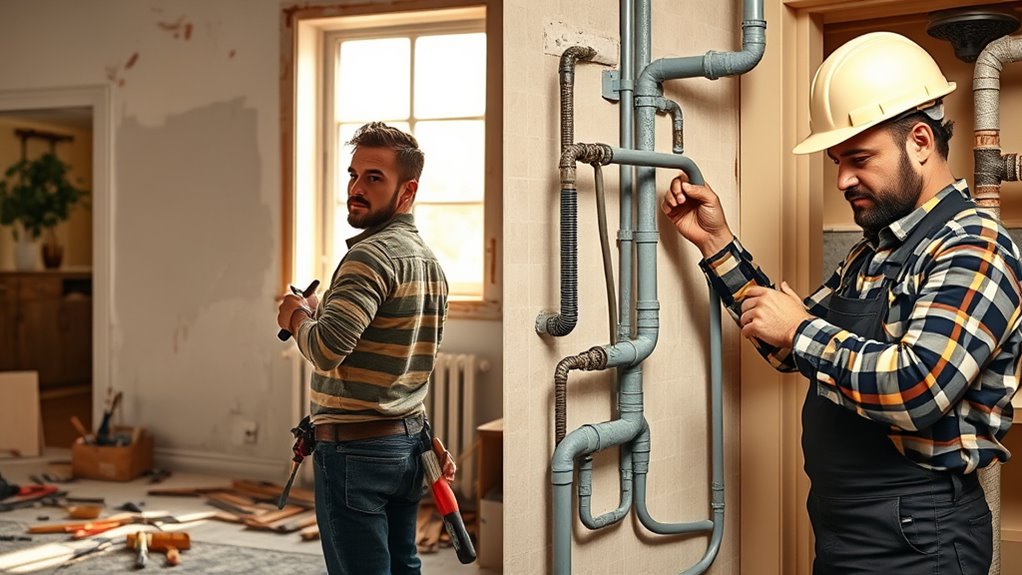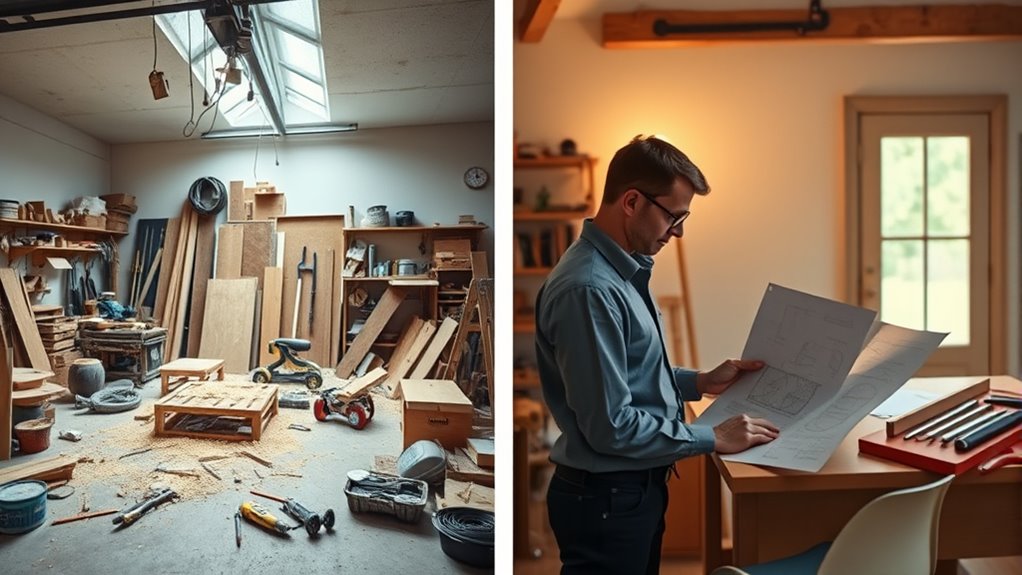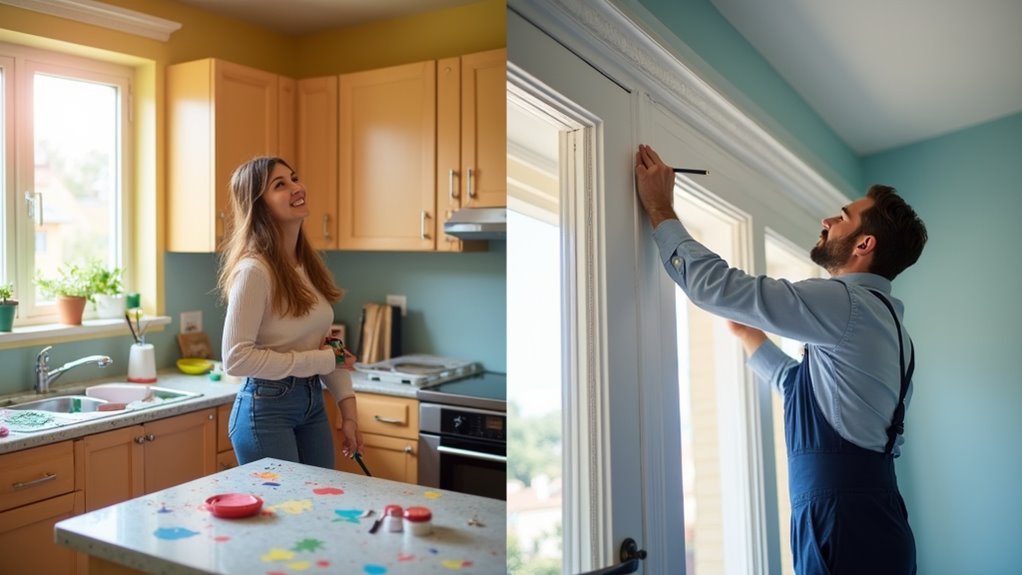When deciding whether to DIY or call a professional, assess your skill level and the project’s complexity. Simple tasks, like painting, usually suit DIY, while complex jobs, like electrical work or structural changes, often require experts. Safety is essential, especially for projects that need permits. Remember, DIY can save money, but mistakes can be costly. Balancing your abilities with professional help can make all the difference in your renovation success. Discover how to find the right balance for your projects.
Key Takeaways
- Assess your skill level and comfort with tools before deciding to tackle a project yourself.
- For complex tasks like electrical or plumbing work, always hire a licensed professional.
- Consider safety risks; some projects may pose hazards that require expert knowledge.
- Evaluate potential costs; DIY mistakes can lead to expensive repairs outweighing initial savings.
- Check permit requirements; projects needing permits often indicate the need for professional assistance.
Understanding Your Skill Level

When you’re deciding whether to tackle a home project yourself or call in a pro, understanding your skill level is essential. Assess your experience with tools and home repairs; if you’re not confident, it’s safer to hire a professional for complex tasks.
Think about the type of DIY projects you’ve handled in the past and your comfort level with potential safety hazards. If a job involves electrical or plumbing work, it’s often best left to licensed experts. Additionally, maintaining children’s welfare during major life changes, like divorce, may also require professional support to navigate complex emotional dynamics. Understanding the importance of advance directives can also help in making informed decisions during significant life changes. When dealing with family matters, consider the role of professional legal guidance to ensure your rights and obligations are clearly understood.
Reflect on your problem-solving skills too; if unexpected issues arise, a pro can save you time and prevent costly mistakes. Ultimately, knowing your limits can lead to better decisions, keeping your home safe and your projects successful. Additionally, understanding the financial considerations in divorce can also inform your decisions if home repairs arise during a significant life change.
Assessing Project Complexity

As you evaluate whether to tackle a project yourself, it’s essential to assess its complexity first. Consider the skills and tools required for your home improvement projects. For instance, while painting might be a straightforward DIY project, plumbing or electrical work often demands specialized equipment and professional expertise. Projects needing permits typically indicate higher complexity and potential risks. Additionally, understanding local building codes can help you determine if a project falls within your skill set or requires a professional’s assistance. Moreover, certain projects, like installing large indoor plants, may require knowledge of watering techniques to ensure proper care and maintenance. In addition, grasping the concept of primitive weapons and their crafting can enhance your self-reliance in a survival scenario, making it relevant for those considering DIY projects in resource-scarce environments. Furthermore, tackling projects involving modern toilet functionality can require a good understanding of plumbing systems and maintenance practices.
| Project Type | Complexity Level |
|---|---|
| Simple (e.g., painting) | Low |
| Moderate (e.g., tiling) | Medium |
| Complex (e.g., structural changes) | High, consider calling a professional |
Evaluating Safety Concerns

Safety should always be your top priority when considering a DIY project.
If you’re tackling tasks that involve electrical work or plumbing, like installing fixtures or working with gas lines, you face significant safety risks. These projects require professional help to avoid dangerous situations like electrocution, flooding, or gas leaks. Additionally, understanding credit card fraud is important when managing personal finances, as it highlights the need for vigilance in various aspects of home safety. Engaging in complex projects, such as juice cleansing, may also require guidance to ensure your health and safety. Monsters in folklore often symbolize the dangers of the unknown, reminding us of the importance of caution in potentially hazardous situations.
Similarly, if you’re making structural changes, such as removing load-bearing walls, you need the proper knowledge and experience to guarantee safety.
Removing load-bearing walls demands expertise; ensure safety by seeking professional guidance for such structural changes.
Projects that require permits or adherence to building codes further indicate the necessity for expert assistance. Additionally, some home projects, like installing a home security system, can be complex and may benefit from professional expertise for optimal performance.
Don’t underestimate the importance of safety; when in doubt, call a professional to protect yourself and your home.
It’s always better to be safe than sorry.
Cost Analysis: DIY vs. Professional Help

Deciding between DIY and hiring a professional often comes down to cost, and a smart analysis can save you a significant amount of money.
DIY projects can offer impressive cost savings, cutting labor expenses by up to 50% for tasks like painting or minor repairs. However, keep in mind that errors in DIY work can lead to costly corrections, sometimes exceeding your initial savings. The emotional toll of mistakes can mirror the challenges faced when divorcing a partner with BPD, adding another layer of stress. Additionally, ensuring proper venting requirements is crucial for safety, which may be overlooked by inexperienced individuals. Preparing for the future by understanding RMD rules can also help make informed decisions about your financial priorities.
On the other hand, professional services come with warranties and insurance, providing peace of mind.
When weighing your options, consider the long run; the potential long-term costs of mistakes can quickly erase any upfront savings you hoped to achieve. Furthermore, some projects, like installing a toilet, require specific knowledge of proper installation techniques to ensure optimal performance and avoid leaks.
Permits and Compliance Considerations

What do you need to know about permits and compliance before starting your DIY project?
First, understand that structural changes, electrical work, and major plumbing alterations usually require permits to guarantee compliance with local building codes and safety standards. Additionally, state tax implications can vary based on the nature of your project and its potential impact on your home’s value. In some states, like Georgia, the average duration for resolving disputes can be lengthy, so it’s crucial to factor in time for compliance. Furthermore, failing to consider required minimum distributions can impact your long-term financial planning when making significant home investments.
It’s essential to consult your local building department to determine the specific permit requirements for your renovations. Failing to obtain necessary permits can lead to fines, delays, and complications when selling your home due to non-compliance.
Also, projects that alter your home’s footprint, like additions or decks, typically need permits to meet zoning laws.
If you’re uncertain about the requirements, it might be wise to call a professional to avoid potential legal issues down the line. Additionally, homes without security systems are 300% more likely to be burglarized, making compliance with safety standards even more critical.
Benefits of Professional Expertise

When you hire a professional, you tap into their specialized knowledge and skills, especially for complex tasks that require precision. This expertise not only guarantees safety and compliance with local codes but also protects you from costly mistakes. Ultimately, investing in a pro can save you time and stress while enhancing the quality of your project. Additionally, professionals often use cost behavior analysis to ensure accurate budgeting and resource allocation, further mitigating potential financial risks. Furthermore, utilizing a data-driven decision-making approach allows professionals to optimize project outcomes based on measurable results.
Specialized Knowledge and Skills
While tackling home improvement projects can be rewarding, it’s essential to recognize the value of specialized knowledge and skills that professionals bring to the table.
Professional contractors possess the expertise needed to handle complex tasks efficiently and safely, often surpassing the average homeowner’s skill level. Many DIY projects, especially those involving plumbing and electrical work, require strict adherence to building codes—something that professionals are trained to navigate.
They also have access to specialized tools and materials, leading to a higher quality finished product. By hiring experts, you can avoid costly mistakes and gain peace of mind, thanks to warranties and insurance coverage that protect you from future liabilities.
Safety and Compliance Assurance
Guaranteeing safety and compliance is essential when it comes to home improvement projects, and hiring a professional can make all the difference. Professionals bring specialized knowledge that helps identify safety hazards and compliance issues, guaranteeing your project meets local building codes and regulations. Here’s how professional expertise benefits you:
| Benefit | Description |
|---|---|
| Safety Assurance | Minimize risks of accidents and guarantee safe installations. |
| Compliance with Permits | Navigate necessary permits to avoid legal troubles. |
| Liability Protection | Licensed pros carry insurance, shielding you from potential losses. |
Finding the Right Balance for Your Renovation

How do you strike the right balance between DIY efforts and hiring a professional for your renovation?
Start by evaluating your skill level and the complexity of the task. DIY projects often seem appealing, but if a job requires a permit or involves complex tasks like electrical work, it’s wise to seek professional help. Mistakes in these areas can lead to costly repairs and safety issues.
Also, consider the time investment; if you’re on a tight schedule, a professional can often get the job done more efficiently.
A smart approach is to combine DIY with professional help—like painting your room while a contractor handles the electrical work. This way, you maximize savings while ensuring quality and safety.
Frequently Asked Questions
When to DIY Vs Professional?
When you’re deciding whether to tackle a project yourself or hire someone, consider your skills and the task’s complexity.
If it’s something simple, like painting a room, you might save some money by doing it yourself.
However, for complex jobs, it’s often safer and more efficient to call in a pro.
Weigh the potential savings against the risk of mistakes, and think about your comfort level with the task at hand.
What Are the Pros and Cons of DIY?
DIY projects can be incredibly rewarding, allowing you to personalize your space and save money on labor costs. You gain valuable skills and a sense of accomplishment.
However, the risks are real; mistakes can lead to costly repairs, especially with complex tasks. Plus, you might underestimate the time required and face safety concerns if the work isn’t done properly.
Weigh these pros and cons carefully before diving into your next DIY project.
Is DIY Really Worth It?
Is DIY really worth it?
Well, if you enjoy spending your weekends wrestling with paint cans and wondering why your bathroom now resembles a modern art installation, it just might be!
Sure, you might save some cash, but those savings can evaporate faster than your patience when mistakes happen.
If you’re not handy, consider whether that DIY triumph is worth the potential chaos—and maybe just let a professional handle the heavy lifting.
When Should You Hire a Contractor?
You should hire a contractor when your project involves permits, structural changes, or complex systems like electrical and plumbing.
These tasks require specialized knowledge and expertise that you mightn’t have.
If safety risks are involved, like demolition work, a professional can handle it efficiently.
If you’re short on time and need to guarantee quality, a contractor can help you complete your project without costly mistakes or delays.
Conclusion
Deciding between DIY and hiring a pro is like choosing between a sturdy ladder and a shaky stool. Trust your skills, but don’t hesitate to seek help when the climb feels too steep. Just as a painter knows when to step back for perspective, you should weigh your project’s complexity, safety, and costs. Finding that balance turns your renovation into a masterpiece, blending your vision with the expertise that elevates your home to new heights.









